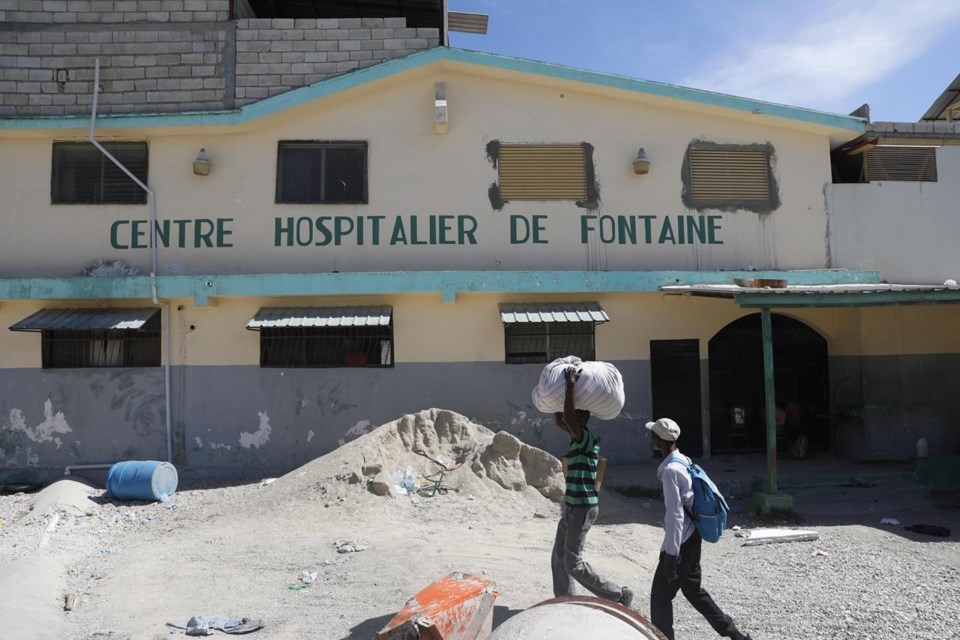PORT-AU-PRINCE, Haiti (AP) — The bullets began piercing the windows of the hospital as women cradling young children ran from room to room searching for a safe place to hide while the heavily armed gang drew closer.
The louder the gunfire grew, the more the women screamed until a hospital employee begged them to stay quiet and ordered them to lie on the ground. Mothers with babies and shaky hands forced one breast into their tiny mouths to keep them quiet, wondering if they would live through Wednesday’s attack on the Fontaine Hospital Center and the surrounding community in the Haitian slum of Cite Soleil.
A couple of hours went by. The gunfire never ceased. Suddenly, an employee appeared, told them to get up and go to the front yard without making noise. Police were waiting with armored cars.
“Get in! Get in! Get in! Get in quickly!” the employees shouted as women carrying children and babies stepped into buses and private ambulances that officers would escort out of Cite Soleil, a rare triumph for a police department that is understaffed, under resourced and outmatched by gangs. Employees also joined the dozens of evacuees, carrying plastic containers that cradled newborns on oxygen.
It was the latest gang attack on a vulnerable and impoverished community in the capital of Port-au-Prince, a show of defiant force and violence that continues to overwhelm a crumbling government that requested the immediate deployment of an international armed force more than a year ago and has yet to arrive.
“A big disappointment is that the state has disappeared,” Jose Ulysse, hospital director and founder, said of the government’s inability to fight gangs as he thanked police for saving people’s lives on Wednesday.
He said he hopes he can reopen the hospital soon as many are left wondering why it was attacked amid speculation it could have been gangs flexing their muscles during an ongoing turf war, signaling that no one is safe.
The assault that forced the evacuation of the hospital and left dozens of homes ablaze was blamed on the Brooklyn gang. It is led by Gabriel Jean-Pierre, nicknamed “Ti Gabriel,” leader of a powerful gang alliance known as G-Pep, one of two rival coalitions in Haiti.
Previous attacks in Cite Soleil and other areas have left hundreds of civilians dead as gangs pillage communities, raping and killing people inside their homes. More than 1,230 killings and 701 kidnappings were reported across Haiti from July 1 to Sept. 30, more than double the figure reported during the same period last year, according to the U.N.
Ulysse said gang clashes in Cite Soleil increased after the recent death of Iskar Andrice, a former math and physics teacher who became a feared gang leader.
During the recent clashes in the sprawling seaside slum that led up to Wednesday’s attack, gangs could be seen traveling by boat to surprise and kill rival gang members, Ulysse said.
“The minute a chief is dead, others will try to control the area,” he said. “It’s a matter of controlling more territory and collecting money.”
Residents worry the violence in Cite Soleil and elsewhere will only escalate as gangs fight to fill the vacuum that Andrice’s death left.
The shooting on Wednesday began around dawn, recalled Edline Pierre, a 26-year-old mother of three. She was at the Fontaine Hospital Center with her two youngest, who were being treated for diarrhea and malnutrition.
By late morning, the gunfire grew closer, and she scampered under a bed with her two children. As bullets began to hit the hospital’s roof and break the windows, she heard people in the yard yelling, “God, come get me!”
Many were in shock and scared, she recalled.
Then, after everyone inside the hospital grew quiet, she heard gangs outside arguing whether or not to burn the facility.
“If it wasn’t for God, (Wednesday) could have been the last day for me on earth,” she said, recalling that police were still shooting at gang members hiding in bushes as they left in ambulances and buses.
Pierre, along with many who were at the hospital that day, is staying at a private home in a safer community for now. She doesn’t know if her eldest child or her mother, who was taking care of her, are alive. Their home was burned during the attack.
Marie-Marthe Pierre, mother of four children, has the same fear. She was at the hospital with her 7-month-old baby and now can’t get ahold of relatives who were caring for her other offspring.
Bullets flew through the windows and hit the walls of the room where she was hiding.
“We were there, stuck, vulnerable,” she said. “If the police hadn’t shown up, I don’t know what would have happened to us.”
A spokesperson for Haiti’s National Police did not return messages for comment.
Those interviewed praised the police and Ulysse, who pleaded for help via social media as the facility came under attack.
Yolande Saint-Philippe, who was at the hospital with the 2-year-old toddler of her 14-year-old daughter who was product of a gang rape, called Ulysse “a good man.”
“He could have abandoned us, but he managed to move us to a safe house where the child is still being fed, I’m still being fed,” she said, explaining that they’re both malnourished. “Lucky for us, God sent us a savior.”
Everyone was evacuated safely from the hospital except for one person: a baby born during the attack who died during a breech birth because gunfire prevented medical staff from helping the mother.
___
Coto reported from San Juan, Puerto Rico.
Evens Sanon And Dánica Coto, The Associated Press




